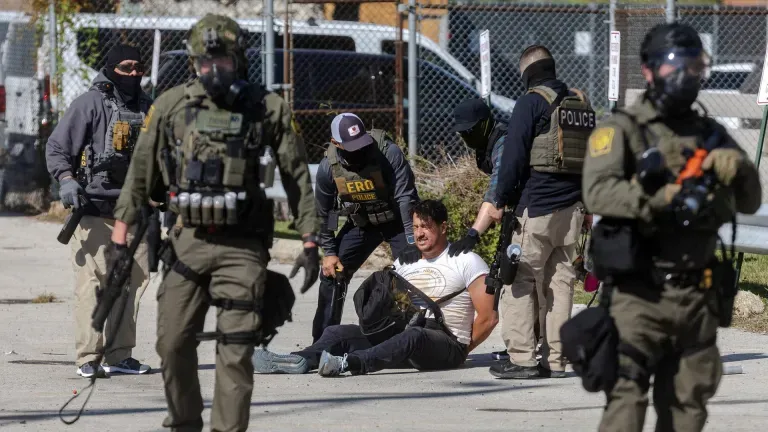In the heart of the Midwest, where skyscrapers intertwine with ethnic neighborhoods like Ukrainian Village, a new wave of immigration enforcement is gaining momentum. Operation "Midway Blitz," launched by the Immigration and Customs Enforcement (ICE) at the beginning of September 2025, has already led to the arrests of nearly 550 individuals in Chicago and its suburbs. Officially aimed at detaining undocumented immigrants with criminal histories — from drug traffickers to gang members — this initiative, named after tragic victim Kathy Abraham, has sparked a wave of anxiety among thousands of immigrants living in the shadows of uncertain status. For the Ukrainian diaspora, one of the largest in the U.S., this is not just an abstract policy: it is a real risk of separation from families and expulsion from a country that became a refuge during the war.
As a veteran journalist of The New York Times with over 30 years of covering immigration crises — from Obama-era deportations to Trump’s border wall chaos — I have seen how such operations often go beyond their stated objectives. Insiders within the Department of Homeland Security (DHS) whisper that "Midway Blitz" is not just a hunt for criminals, but also a signal from the Trump administration about returning to a hardline stance. "It’s about restoring control," said one DHS official on condition of anonymity. "But in the chaos of Chicago’s streets, boundaries are blurring." The operation, officially launched on September 8, has already caused protests, clashes with activists, and even gunfire when an ICE agent shot and killed a man during an arrest attempt in a suburb. Local human rights groups, such as the Illinois Coalition for Immigrant and Refugee Rights (ICIRR), accuse authorities of illegal arrests without warrants, while protesters block entry to detention centers, chanting slogans against "wars on the community."
For Ukrainians, whose community in Chicago numbers over 50,000 and serves as a support hub for those fleeing Russian aggression since 2022, the threat is especially acute. Many arrived under temporary protected status (TPS) or through parole programs, but bureaucratic delays often lead to visa overstay. "If you work in a restaurant or construction in the suburbs like Oak Park or Norridge, the risk of being stopped in the street or searched at work is real," explains Maria Kuzma, an immigration attorney representing Ukrainian families. "ICE doesn’t always distinguish: criminal history or simply lack of papers." According to DHS, those arrested include citizens from Colombia, Mexico, and other countries, but insiders note that checks extend to a broader spectrum, including Eastern Europeans. This reminds me of 2017 when similar raids in New York led to the deportation of hundreds with no criminal record, tearing communities apart.
However, as in past campaigns, there are ways to defend yourself. Don’t open the door without a court order — it’s your constitutional right. Keep contacts of an immigration lawyer handy, and reach out to organizations like ICIRR that offer free consultations and hotlines. "Be cautious and informed about your rights," Kuzma advises. "Knowledge is a shield." Chicago Mayor Brandon Johnson, a consistent critic of Trump, promises support for the city’s "sanctuary" status, but federal authorities ignore local laws, just as during "Operation Apocalypse Now" in Vietnam — an analogy Trump himself used to describe his campaign against Chicago.
While DHS denies accusations of overreach — "We’re just enforcing the law" — the reality on the streets tells a different story. Protests outside the Brooklyn center, where ICE agents used tear gas and rubber bullets, have turned into daily clashes, drawing attention from Native Americans and religious leaders alike. This is not just an immigration operation; it’s a test of American democracy’s resilience, where fear and hope intertwine in the fates of thousands. For Ukrainians who found a new home here, "Midway Blitz" is a reminder: freedom is fragile, but community is strong. If history teaches anything, it’s that resistance and solidarity often defeat chaos.


